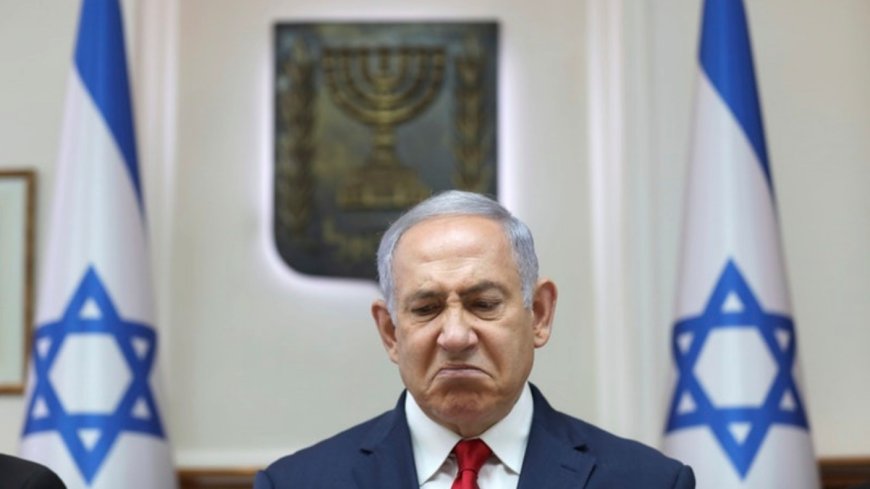Netanyahu's Policies and Actions Blamed for Recent Israel-Gaza Conflict
The recent Israel-Gaza conflict has left a trail of devastation and loss, prompting intense scrutiny of the factors that contributed to this deadly escalation. At the center of this discussion is Benjamin Netanyahu, whose policies and actions are being held responsible for what has been termed the deadliest raid into Israeli territory in half a century.

Israeli opinions have unequivocally pointed towards a combination of intelligence failures and Netanyahu's approach towards Palestinians as the catalysts for this tragic turn of events.
Escalating Tensions and Consequences
Netanyahu's government, characterized by an agenda of "annexation and dispossession," set a tone that escalated tensions. Controversial appointments to key positions, including right-wing figures Bezalel Smotrich and Itamar Ben-Gvir, further stoked the flames. Smotrich, as finance minister, expanded Israeli settlements in the West Bank and vehemently opposed Palestinian statehood. Ben-Gvir, as security minister, faced charges of hate speech against Arabs. These appointments signaled a departure from cautious leadership to a more aggressive stance, prioritizing political considerations over national interests. The foreign policy under Netanyahu's tenure has been criticized for neglecting the existence and rights of Palestinians. This approach not only heightened tensions but also set the stage for a disastrous intelligence failure. While the military and intelligence agencies are not absolved of their own shortcomings, Netanyahu's ultimate responsibility for Israeli foreign and security affairs remains unquestionable.
Snowden's Revelations: Failures and Consequences in the Al-Aqsa Storm Operation
In a shocking revelation, former NSA official Edward Snowden has pointed out the failure of the Israeli intelligence system in the operation "Al-Aqsa Storm." According to Snowden, this failure was a result of negligence on the part of the administration against Hamas' movements. He further criticized Netanyahu's government for its involvement in the Pegasus spying scandal. The Pegasus spy program, developed by the NSO Group and supported by the Israeli government, has been sold to various countries, including those with questionable human rights records. Snowden emphasized that this program, designed to spy on opponents, has ultimately failed in its mission against Hamas.The conflict's human toll is staggering. According to the Palestinian health ministry, over 400 people, including scores of children, have lost their lives in Israeli strikes. On the Israeli side, the toll continues to rise, with hundreds of lives lost in the deadliest raid in decades. These numbers paint a grim picture of the cost of this conflict on both sides. As the repercussions of this conflict continue to reverberate, it is imperative to critically examine the policies and decisions that led to this tragic escalation. Netanyahu's leadership, once characterized by cautiousness, has evolved into a more assertive stance that prioritizes political considerations over national interests. The consequences of these decisions are felt most acutely by the victims of this conflict, who bear the brunt of the catastrophic events that unfolded on Simchat Torah. It is a somber reminder of the profound impact that political decisions can have on the lives of countless individuals caught in the crossfire.
The Palestinian Journey Through War and Loss
Palestinians have suffered through war, loss, and displacement. Since the early 20th century, civilians and fighters have died on their trek. These tragedies have etched themselves in the collective memory of a country seeking peace and independence. Several major battles preceded Israel's founding in 1948. Arabs lost several lives in the 1920, Jaffa, and 1929 Palestine riots. Though separate, these events laid the ground for decades of Palestinian rights and sovereignty struggle. Between 15,550 and over 24,000 fighters and civilians died in the 1936–1939 Arab rebellion in Palestine. This period shaped Palestinian resistance and set the stage for future fights. The 1948 founding of Israel was a turning point. Palestinian deaths were high during the Nakba, the Arab-Israeli War. The death toll is estimated at 3,000–13,000. This struggle and exile is imprinted in Palestinian memory. The fedayeen wars, Qibya massacre, and Battle of Karameh devastated Palestinian villages in subsequent decades. The War of Attrition, Black September in Jordan, and other battles increased casualties. One of the darkest periods in this terrible history was the 1982 Lebanon War, with 15,000–20,000 deaths. Approximately 13,400 people died and were injured in the Second Intifada (2000–2005). Gaza's 2008-2009, 2012, 2014, and 2021 wars have perpetuated this pattern of civilian casualties. These data, albeit striking, merely hint at the devastating effects of these conflicts on Palestinian communities. Each number represents a tragedy, a broken family, and a wounded community. Immeasurable damage has been done to Palestinian mental health, infrastructure, and society. As we consider these figures, we must realise that each statistic represents a life, narrative, and legacy. It calls for an equitable and sustainable Israeli-Palestinian peace that respects everyone's rights.













































